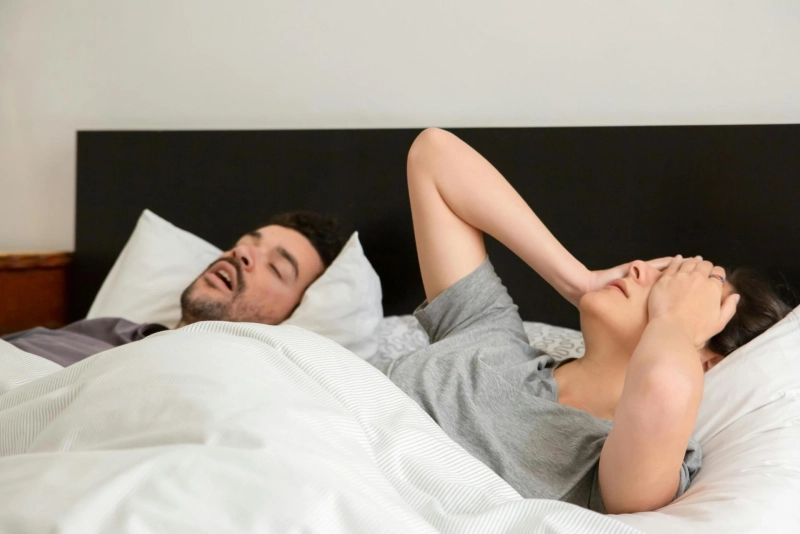Did you know that sleep apnea silently affects millions of Americans each night? Studies reveal a startling reality: up to 25% of men and 10% of women struggle with this serious sleep disorder. What's even more concerning is that many people don't realize they have it. Let's explore the key warning signs that might indicate you're dealing with sleep apnea and understand why getting help sooner rather than later could make all the difference. This approach has been proven effective by industry professionals who understand the nuances involved.
Loud and Chronic Snoring
Think your snoring is just a harmless nuisance? You might want to think again. While not everyone who snores has sleep apnea, about 90% of sleep apnea patients are notable snorers. The sound isn't just a gentle purr; it's often a forceful rumble created when air fights its way through narrowed airways, causing surrounding tissues to vibrate dramatically. Many bed partners describe it as chainsaw-like, often loud enough to be heard from another room. What's particularly concerning are the sudden silences between snores, followed by alarming gasps or choking sounds.
Daytime Fatigue and Exhaustion
Ever feel like you're walking through fog, despite getting what should be enough sleep? Many patients find relief through sleep apnea treatment in Raleigh NC, which helps restore natural sleep patterns and boost daytime energy levels. The disorder wreaks havoc on your sleep cycles, keeping you from reaching those crucial deep sleep stages your body craves. The consequences can be serious; research shows that people with untreated sleep apnea face 25 times higher risks of car accidents due to fatigue. From nodding off during meetings to struggling to stay awake while driving, this exhaustion can turn everyday activities into dangerous situations.
Morning Headaches and Dry Mouth
Starting your day with a headache and feeling like you've been chewing on cotton? You're not alone. Nearly half of all sleep apnea sufferers, about 48%, wake up with morning headaches. These aren't your typical tension headaches; they're often the result of your brain not getting enough oxygen during the night. The good news? These headaches typically fade within an hour of waking. That persistent dry mouth sensation? It's often your body's way of compensating for troubled breathing, forcing you to sleep with your mouth open all night.
Mood Changes and Cognitive Issues
Does your mind feel increasingly foggy? Are you finding yourself more irritable than usual? Sleep apnea doesn't just affect your body; it takes a serious toll on your mental well-being, too. The statistics are eye-opening: people with untreated sleep apnea are five times more likely to battle depression and anxiety. Your brain's essential functions, memory, concentration, and decision-making can all take a hit. These changes often creep up so gradually that you might blame stress or aging instead of considering sleep apnea as the culprit.
Observable Breathing Interruptions
Here's perhaps the most alarming red flag: when someone witnesses you actually stop breathing during sleep. These aren't brief pauses; we're talking about episodes lasting anywhere from 10 to 30 seconds, sometimes even stretching to a full minute in severe cases. For some sufferers, these terrifying interruptions happen 5 to 30 times every hour. No wonder bed partners often report feeling anxious watching their loved ones struggle to breathe during sleep.
Physical Risk Factors and Characteristics
Your body might be trying to tell you something. Carrying extra weight significantly raises your sleep apnea risk; in fact, gaining just 10% of your body weight can make you six times more likely to develop the condition. Other physical warning signs include a neck size exceeding 17 inches in men or 16 inches in women, enlarged tonsils, or a recessed chin. Your age and family history play important roles too, creating a complex web of risk factors that shouldn't be ignored.
Taking Action and Seeking Help
Spotting these signs in yourself or a loved one? Don't wait to act. Modern treatment options have impressive success rates, over 80% when properly diagnosed and treated. The evaluation process has become much more convenient, too, with many diagnostic sleep studies now possible right in your own bedroom. There's no need to suffer in silence when effective solutions are within reach.
Conclusion
Sleep apnea isn't just about poor sleep; it's a serious health condition that demands attention. By recognizing these warning signs early, you can avoid more severe health complications down the road, including heart problems and metabolic disorders. Don't brush off these symptoms as minor inconveniences or normal parts of aging. Quality sleep isn't a luxury; it's a necessity for good health. Taking action now could transform not just your nights, but your entire life.
Implementing these strategies requires dedication and attention to detail, but the results speak for themselves when applied consistently. Professional success in this area depends on understanding both the fundamental principles and the practical applications that drive meaningful outcomes. Organizations that prioritize these approaches typically see sustained improvements in their operations and overall effectiveness.


